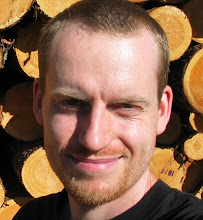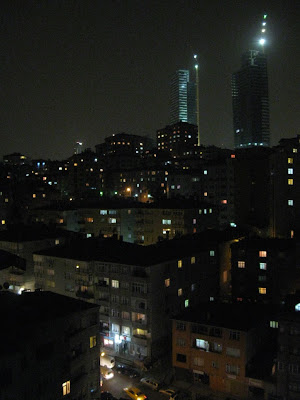For the last week or so I have stayed at the Nomads hostel in Veliko Tarnovo. As far as hostels go, this is a very special place. It is the home of two Bulgarians, Georgie and Fedio, who decided to share their home, cooking skills and life philosophy with traveling folk like me. They live with their guests, they live through their guests (they don't need to travel because the world travels to them) and they live because of their guests (obviously you do pay some money for the accommodation).
The homey front room at Nomads...

For most of the nights I was the only guest and Fedio acted as a kind of personal chef, cooking up tasty Bulgarian meals.

No matter what dish he had prepared, it was always accompanied by bread, pickles, cheese and Bulgarian salami. Similar to the tradition in Hungary, meals where started with a glass of fruit brandy. Here they call it Rakija. Ours was self-distilled and the stuff was so strong that we always had to thin it down with lots of water.

Feta cheese is so popular, it comes in huge tins. Hopefully your fridge is big enough to fit it in.

The hostel is situated on top of cliffs in the beautiful historic part of the town...
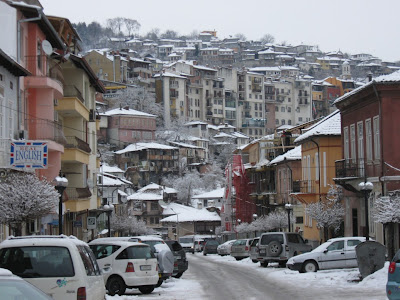
...and offered magnificent views from the balcony

Almost every evening we had friends of Fedio around. One of them was Ludmil and he explained to me that the town of Tarnovo is a miracle. According to his estimates, about 80% of the population live in survival mode, and yet the town has three big home electronics shopping centres. He reckons the only reason that they have survived the last few years is because they are a cover up for money laundring.

On my excursions through town I kept coming across these death notices. They could be on anything and anywhere, in groups or individually, usually however on front doors. In some streets there seemed to be so many, I started wondering if they were struggling with some deadly disease or other. When I enquired about it, my host explained to me that it is custom not just to publicly announce when someone has died, but also to re-announce the death after certain intervals (like after 40 days, 3, 6 and 9 months, 1, 2, 3 years and so on...).
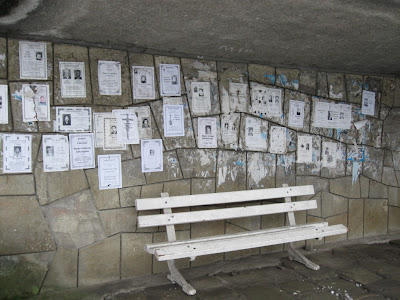
Planing public transport by bus in Bulgaria has been the most diffucult so far. Bus stops are easy to recognise (here in Tarnovo they are marked by these concrete pillars, or the standard bus signs) however there are no bus schedules to be found anywhere, they simply dont exist. At the tourist information they confirmed this for me with a “Yeah, that's the way it works here”. In the busy town centre, a bunch of people hanging around the bus stop is a good indication that there should be a bus soon, but you still don't know whether it will be the right line taking you to your desired destination. For long distance bus connections there is at least a website, and it even comes in an English version. It doesn't work with the Latin spelling of town names however (Bulgarian is based on the Cyrillic alphabet), so don't get too excited. At first I thought there simply are no bus connections to the places I wanted to visit and it took me a while to figure this out. So what you have to do is this: first you go to the website for train connections. There you can pick from a long list your departure and destination. The lists are of course in Cyrillic, so you need to have some idea what the Cyrillic writing of your destination looks like (thank goodness I had Russian classes at school!). From the next page you can then copy the Cyrillic names of departure and destination and paste them one by one into the bus connection website. Hit search and voilà, there are all your bus connections.
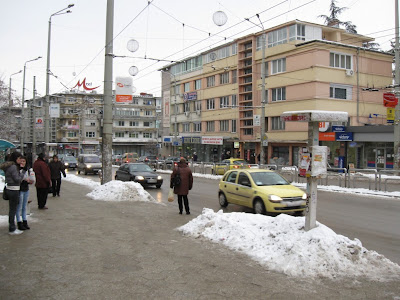
There are numerous monasteries in Bulgaria with beautiful wall paintings (this one was a 2 hour hike in the woods from Tarnovo) and it was places like this that helped religious traditions to survive the years of communism.

One of my day trips took me to the town of Tryavna, but the whole trip was really about using local trains. People getting off the train didnt seem to care about closing the doors behind them and being old trains as they were, without automatic door closing mechanisms, the train would just roll with the doors wide open. As a result, sooner or later it got quite cold in the train and only at that point someone would take care of the door situation. None of the doors seemed to shut properly however, there would always be a gap big enough to squeeze your hand through.

These old trains had one very nice feature though and that was those 4-person wide benches with foldable armrests, giving you plenty of space to stretch out. For my return to Tarnovo I again used a local train, but this time it was called a fast train. Since my return ticket was valid for the slow category trains only I had to pay some top-up to the conductor. The funny thing was however that it took virtually the same time as on the way down, a solid hour for a distance of just over 40km.

On my last day trip from Tarnovo I went to the Shipka village to have a look at a Thracian burial mound. The Thracian people inhabited the Balkan region around 2000-3000 years ago and according to my host left over 100.000 of these burial mounds in Bulgaria alone.

It was only six years ago that someone discovered a tomb inside one of these mounds. Being a snowy day in early February and at a location off the main tourist track, I stood there all by myself inside the burial chamber – and I started feeling somewhat intimidated by the place. The chamber was made from a solid 3x2x2m granite rock into which a room had been chiseled, and then it had been covered with another huge piece of granite. The imagination of finding ones final resting place in a room like this was a very unpleasant thought.

From Shipka I wanted to hitchhike back to Gabrovo, a town about half way on the way back to Tarnovo, and then take a bus from there. Before I even managed to fully stretch out my arm a car pull over. Inside was a friendly big fellow and he indicated I should get in. He was a truck driver who had just come back from a tour to Hamburg. When he mentioned Hamburg I got my map of Europe out and showed him where I come from. He got really excited then and I had to put it away again quickly because it seemed to distract him a little bit too much. We were driving on a bendy and snowy road up to a mountain pass, and he was driving rather fast as it was, way too fast for my liking given the road conditions. I was clutching to the handle above the passenger door and really surprised that we didn't skid, not even in the sharper bends. I asked him about this and he smiled at me and said that the car was a VW Syncro, a 4-wheel drive. We were virtually glued to the road in this thing. His kids had been bugging him to replace the 25 year old banger, but he felt a reliable car like this one (it had 400.000km on the clock and still its first engine) is hard replace.

My driver spoke in broken German, that is how we managed to communicate. At some point he started with politics, but communication was just too difficult for this subject. Apparently a lot of money has disappeared (“Zapp ze rapp”) during the political change, which he was not very happy about, especially as his pension, after 32 years of truck driving, will be just 60€ per month.
Despite the communication problems the ride was very enjoyable and interesting for me and so I scrapped the idea of getting off in Gabrovo and went all the way back to Tarnovo with this guy. Take care, man!
Some statistics:
distance travelled this year since leaving home: 1937km
transportation costs: 5.5cent/km
shortest wait for a hitch: 3 seconds




